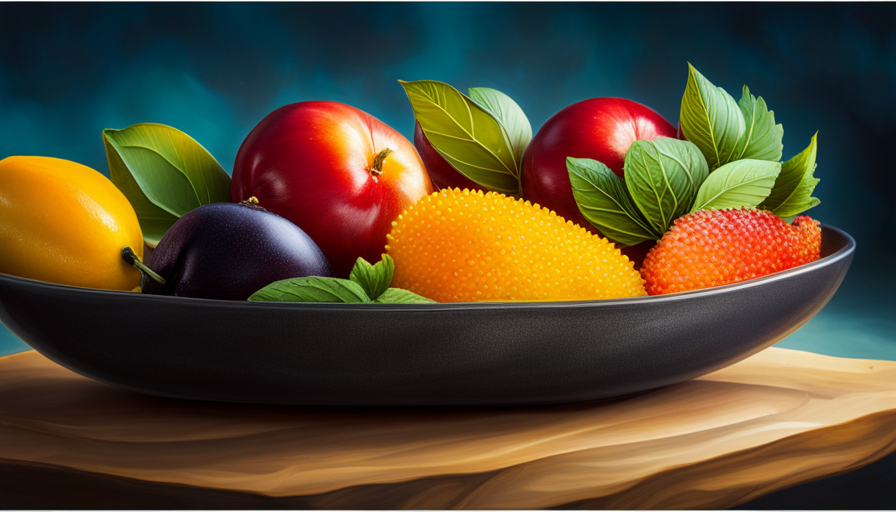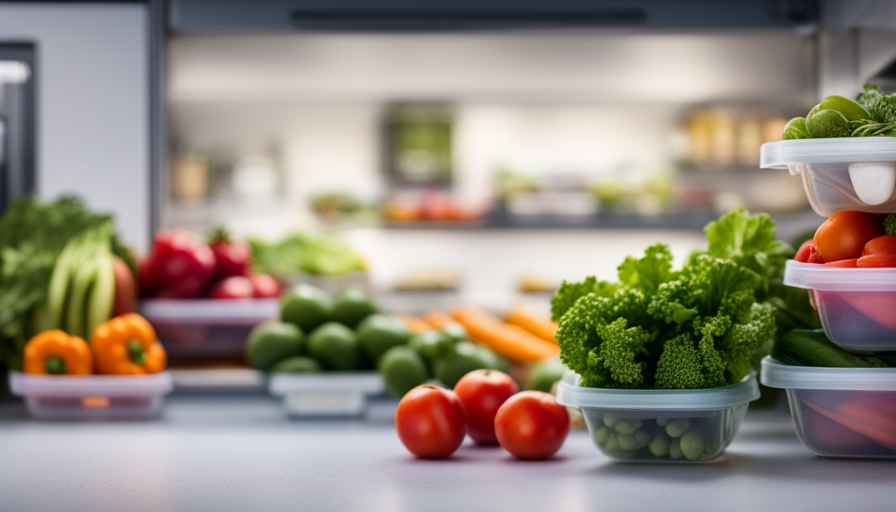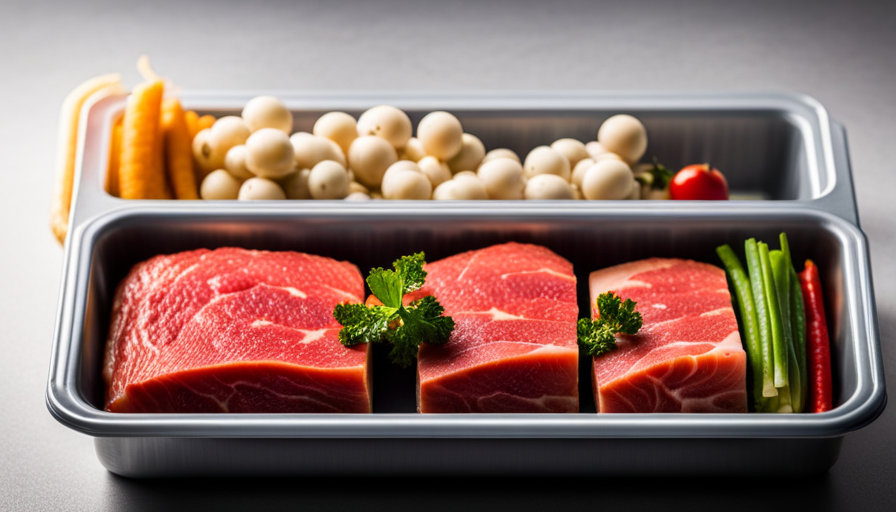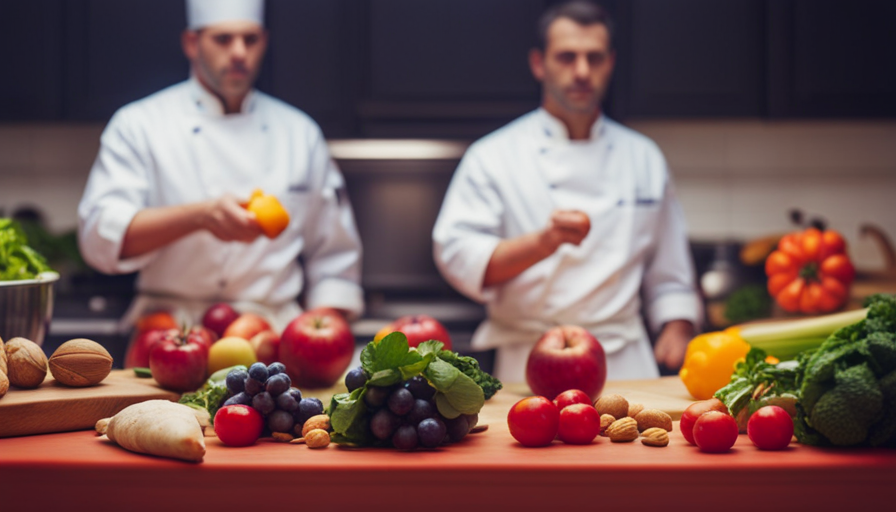Have you ever considered how adding a splash of lemon juice can completely transform the taste of a dish? Similar to a beam of sunlight breaking through clouds on a dreary day, lemon juice has the power to elevate and brighten the flavor of unseasoned food.
It’s like a secret ingredient that adds a zing of freshness and a hint of tanginess to any culinary creation. But its benefits go beyond simply enhancing taste. Lemon juice has a multitude of effects on raw food, from tenderizing meat and seafood to preventing browning in fruits and vegetables.
It acts as a natural preservative, boosts vitamin C content, and even offers antibacterial properties. In this article, we’ll explore the many ways lemon juice affects raw food, diving into the science behind its actions and uncovering the health benefits it brings.
So grab your apron and let’s embark on a citrus-infused culinary adventure!
Key Takeaways
- Lemon juice enhances the flavors of raw food and adds freshness and tanginess to dishes.
- Lemon juice prevents browning in fruits and vegetables and improves their shelf life.
- Lemon juice helps maintain the vibrant colors of produce and enhances their taste.
- Lemon juice is a pH balancer, a great source of vitamin C, and boosts immune function.
Tenderizing Meat and Seafood
Lemon juice works wonders in tenderizing meat and seafood, making them irresistibly juicy and tender. One of the ways lemon juice achieves this is through its natural acidity. The acid in lemon juice breaks down the tough proteins in meat, making it more tender and easier to chew. When used as a meat marinade, lemon juice not only adds flavor but also helps to break down connective tissues, resulting in a more tender and flavorful dish.
Seafood ceviche, a dish in which raw fish or seafood is marinated in citrus juices, is another example of how lemon juice can tenderize food. The acid in the lemon juice denatures the proteins in the seafood, effectively ‘cooking’ it without heat. This process gives the seafood a tender and delicate texture, while also imparting a refreshing citrus flavor.
Moving on to the next topic, lemon juice also serves another important purpose in the kitchen: preventing browning in fruits and vegetables.
Preventing Browning in Fruits and Vegetables
To maintain the vibrant colors of your produce, try incorporating a splash of tangy citrus. Lemon juice can be a great tool for preventing enzymatic reactions that cause fruits and vegetables to brown. When fruits and vegetables are cut or bruised, enzymes are released that react with oxygen in the air, leading to browning. However, the citric acid in lemon juice can help slow down these reactions and keep your produce looking fresh and appealing for longer periods of time.
In addition to preventing browning, lemon juice can also improve the shelf life of certain fruits and vegetables. The acidity of lemon juice creates an inhospitable environment for bacteria and other microorganisms that can cause spoilage. By adding lemon juice to your fruits and vegetables, you can help extend their freshness and reduce the risk of foodborne illnesses.
To illustrate the benefits of lemon juice in preventing browning, consider the following table:
| Fruit/Vegetable | Without Lemon Juice | With Lemon Juice |
|---|---|---|
| Apple | Browning occurs | No browning |
| Avocado | Browning occurs | No browning |
| Banana | Browning occurs | No browning |
| Pear | Browning occurs | No browning |
| Potato | Browning occurs | No browning |
By incorporating lemon juice, you can prevent enzymatic reactions and improve the shelf life of your fruits and vegetables. This not only helps to maintain their vibrant colors but also ensures their freshness and safety. Now, let’s move on to the next section about enhancing flavor in salads and dressings.
Enhancing Flavor in Salads and Dressings
Adding a burst of tangy citrus can transform your salads and dressings, elevating their flavor to new heights. Lemon juice is a versatile ingredient that not only adds a refreshing tang but also enhances the presentation of your dish. Its vibrant yellow color and zesty aroma make it visually appealing and appetizing.
When used in dressings, lemon juice creates unique flavor profiles by balancing out the richness of oils and other ingredients. It adds a bright and acidic element that complements a variety of flavors, from creamy avocado to peppery arugula. The acidity of lemon juice also helps to highlight the natural flavors of the vegetables and fruits in your salad, making each bite more enjoyable.
In addition to enhancing flavor, lemon juice acts as a natural preservative, helping to keep your salads and dressings fresh for longer periods. Its high acidity inhibits the growth of bacteria and fungi that can cause spoilage. This natural preservative property of lemon juice allows you to prepare your salads in advance without worrying about them losing their freshness.
By adding lemon juice to your salads and dressings, you can not only enhance their flavor but also ensure that they stay fresh and appetizing for longer. So go ahead and squeeze that lemon, and take your salads and dressings to the next level of deliciousness.
Acting as a Natural Preservative
With its high acidity, the tangy citrus fruit’s juice acts as a natural preservative, keeping your salads and dressings fresh and delicious for longer periods. Lemon juice has been used for centuries to preserve food due to its high concentration of citric acid, which creates an inhospitable environment for bacteria and other microorganisms that cause food spoilage.
This acid inhibits the growth of bacteria by lowering the pH level, making it difficult for them to survive and reproduce. By preserving freshness and prolonging the shelf life of raw food, lemon juice allows you to enjoy your salads and dressings for an extended period without compromising taste or quality.
In addition to its preservative properties, lemon juice also adds brightness and freshness to dishes. Its tangy flavor enhances the taste of salads and dressings, giving them a vibrant and refreshing twist. The citric acid in lemon juice acts as a natural flavor enhancer, bringing out the natural flavors of the ingredients and making them more enjoyable to eat.
So, not only does lemon juice help preserve your food, but it also adds a burst of flavor that can elevate your dishes to the next level.
Adding Brightness and Freshness to Dishes
Imagine yourself taking a bite of a crisp, refreshing salad, the flavors dancing on your taste buds, and the brightness of the dish instantly bringing a smile to your face. Lemon juice, with its tangy and citrusy taste, has the amazing ability to add acidity to raw food, enhancing its overall taste and presentation.
When added to salads, lemon juice not only provides a burst of freshness but also helps to balance out the flavors by cutting through the richness of other ingredients. The acidity of lemon juice can also enhance the natural flavors of fruits and vegetables, making them taste even more vibrant and delicious.
In addition to its taste-enhancing properties, lemon juice also plays a role in the visual appeal of dishes. Its vibrant yellow color adds a pop of brightness to salads, making them visually appealing and appetizing. Lemon juice can be used as a dressing or a marinade for raw fish, meat, or vegetables, adding a tangy kick and giving them a beautiful glossy finish.
So, next time you prepare a salad or a raw dish, consider adding a squeeze of lemon juice to enhance its flavors and presentation. But, the benefits of lemon juice don’t stop there. It also has the unique ability to balance pH levels in recipes, which we will explore in the next section.
Balancing pH Levels in Recipes
Adding brightness and freshness to dishes is just one of the many benefits of using lemon juice in cooking. Another important role that lemon juice plays is in balancing pH levels in recipes.
The science behind pH levels in cooking is fascinating and understanding it can greatly enhance your culinary skills. pH is a measurement of acidity or alkalinity, and it is an essential factor in achieving the right balance of flavors in a dish.
Lemon juice, although acidic in nature, has an alkalizing effect on the body once ingested. This makes it a popular ingredient in recipes for alkaline diets. When added to recipes, lemon juice can help neutralize overly acidic flavors and create a harmonious balance. It can also enhance the natural flavors of ingredients and brighten up the overall taste of a dish.
Understanding the science behind pH levels in cooking allows you to create well-rounded and delicious meals. Experimenting with different amounts of lemon juice can help you achieve the perfect balance for your taste buds.
Transitioning into the subsequent section about boosting vitamin C content in raw foods, it is important to note that lemon juice is not only a pH balancer, but it is also a great source of vitamin C, which is essential for our overall health and well-being.
Boosting Vitamin C Content in Raw Foods
Boosting the vitamin C content in uncooked dishes is crucial for maintaining optimal health and wellness. Lemon juice is a great way to increase the antioxidant levels and improve immune function in raw foods. This citrus fruit is known for its high vitamin C content, which plays a vital role in supporting a healthy immune system.
Adding lemon juice to salads, smoothies, or dressings can help enhance the nutritional value of these raw dishes. Vitamin C is a powerful antioxidant that helps protect the body against free radicals and oxidative stress. It’s been shown to boost immune function by stimulating the production of white blood cells, which are essential for fighting off infections and diseases.
Incorporating lemon juice into your raw food recipes can provide a natural and flavorful way to increase your vitamin C intake. In addition to its immune-boosting properties, lemon juice also supports digestion and detoxification. The citric acid found in lemons can help stimulate the production of digestive enzymes, which aid in the breakdown and absorption of nutrients. It can also act as a natural detoxifier, helping to flush out toxins from the body.
By incorporating lemon juice into your raw food dishes, you can increase the vitamin C content, boost antioxidant levels, improve immune function, and support digestion and detoxification. Transitioning to the subsequent section about supporting digestion and detoxification, we can explore the benefits of including other raw ingredients such as ginger and turmeric.
Supporting Digestion and Detoxification
To enhance your digestion and detoxification, try incorporating ingredients like ginger and turmeric into your meals. These powerful ingredients have been shown to support gut health and aid in nutrient absorption.
Ginger has long been used as a natural remedy for digestive issues, such as bloating, nausea, and indigestion. It contains compounds called gingerols and shogaols, which’ve been found to stimulate digestive enzymes and improve the movement of food through the digestive tract.
Turmeric, on the other hand, contains a compound called curcumin, which has been shown to have anti-inflammatory and antioxidant properties. This can help reduce inflammation in the gut and support overall digestive health.
Additionally, both ginger and turmeric have been found to have antimicrobial properties, which can help fight off harmful bacteria in the gut. So, by incorporating these ingredients into your meals, you can support your digestion, aid in nutrient absorption, and offer antibacterial and antimicrobial properties to your body.
Offering Antibacterial and Antimicrobial Properties
Ginger and turmeric, with their powerful ingredients, bring more than just flavor to your meals – they pack a punch against harmful bacteria, offering antibacterial and antimicrobial properties. These properties make lemon juice an effective natural remedy for promoting digestive health and supporting the body’s detoxification processes.
But that’s not all! Lemon juice also offers antiviral benefits, helping to strengthen the immune system and protect against viral infections.
Here are three reasons why lemon juice’s antibacterial and antimicrobial properties are so important:
-
Lemon juice can help kill harmful bacteria in the digestive system, promoting a healthy gut flora and reducing the risk of digestive issues such as bloating, indigestion, and constipation.
-
The antimicrobial properties of lemon juice can inhibit the growth of bacteria on raw foods, reducing the risk of foodborne illnesses and ensuring safer consumption.
-
Lemon juice’s antiviral benefits can support the immune system, helping to fight off common viruses and reduce the severity of symptoms during cold and flu season.
With its antibacterial, antimicrobial, and antiviral properties, lemon juice is a powerful ally in promoting overall health and wellness. It not only supports digestion and detoxification but also strengthens the immune system, making it an essential ingredient to incorporate into your daily routine.
Promoting Overall Health and Wellness
Improve your overall health and well-being by incorporating the incredible properties of lemon juice into your daily routine. Lemon juice is not only a refreshing and tangy addition to your meals and beverages, but it also offers numerous benefits for your mental and physical health.
One of the ways lemon juice promotes mental well-being is by boosting mood and reducing stress. The scent of lemon has been found to have mood-enhancing effects, helping to alleviate symptoms of anxiety and depression. Additionally, lemon juice contains vitamin C, which is known to support the production of serotonin, a neurotransmitter that regulates mood.
Lemon juice is also a great source of natural energy. Despite its acidic taste, lemon juice actually has an alkalizing effect on the body, helping to balance pH levels and promote optimal energy production. Furthermore, the high vitamin C content in lemon juice can help combat fatigue and increase energy levels.
To help you visualize the various health benefits of lemon juice, here is a table highlighting some of its key properties:
| Properties | Benefits |
|---|---|
| Mood-enhancing | Reduces stress and anxiety |
| Alkalizing | Increases energy levels |
| High in vitamin C | Combats fatigue |
Incorporating lemon juice into your daily routine is a simple and effective way to promote your overall health and wellness. Whether you squeeze it into a glass of water, use it as a salad dressing, or add it to your favorite recipes, lemon juice can make a significant difference in your well-being.
Frequently Asked Questions
Can lemon juice be used to tenderize meat and seafood?
Yes, lemon juice can be used to tenderize meat and seafood. It has a natural tenderizing effect due to its high acidity. When used as a marinade, the lemon juice breaks down the proteins in the meat or seafood, resulting in a more tender texture. Additionally, lemon juice adds a tangy flavor to the dish. So, incorporating lemon juice in your marinades can provide both tenderizing benefits and enhance the taste of your meat and seafood dishes.
How does lemon juice prevent browning in fruits and vegetables?
Lemon juice is like a superhero shield for fruits and vegetables, preventing oxidation and inhibiting enzymatic browning. It acts as a natural barrier, blocking the harmful effects of oxygen and enzymes that cause discoloration.
The high levels of vitamin C in lemon juice work as antioxidants, neutralizing free radicals that promote browning. So, when you add lemon juice to your raw food, it stays fresh and vibrant for longer, thanks to its amazing protective powers.
What are some ways to enhance flavor in salads and dressings using lemon juice?
To enhance flavor in salads and dressings, lemon juice can be a refreshing addition. It’s tangy and citrusy taste adds a burst of freshness to the dish. Lemon juice can also be used in desserts, where it’s acidic properties balance out the sweetness and add a zesty twist. Furthermore, lemon juice can be a great way to add a touch of brightness and freshness to beverages, making them more enjoyable and flavorful.
How does lemon juice act as a natural preservative in food?
Lemon juice is an effective natural preservative for food due to its high acidity and antimicrobial properties. The citric acid in lemon juice helps inhibit the growth of bacteria, fungi, and other microorganisms, extending the shelf life of perishable food items.
Additionally, the antioxidants in lemon juice can slow down the oxidation process, preventing discoloration and maintaining the freshness of fruits and vegetables. Incorporating lemon juice as a natural preservation technique offers numerous benefits, including increased food safety and prolonged storage.
Can lemon juice boost the vitamin C content in raw foods?
Lemon juice can indeed boost the vitamin C content in raw foods, which is essential for boosting immunity and preserving nutrients.
Just like a superhero, lemon juice swoops in and saves the day by preventing the oxidation of vitamin C. This powerful antioxidant not only helps to maintain the nutritional value of the food but also strengthens our immune system, keeping us healthy and strong.
So, squeeze some lemon juice on your raw foods to give them an extra dose of vitamin C goodness!
How Does Lemon Juice Affect the Rawness of Food?
Understanding raw food concept involves knowing how lemon juice affects it. Lemon juice can actually help reduce the rawness of certain foods like fish or vegetables by adding a tangy flavor and breaking down tough textures. It’s a great way to enhance the taste and texture of raw dishes.
Conclusion
In conclusion, incorporating lemon juice into raw food dishes can have numerous benefits. Not only does it tenderize meat and seafood, but it also prevents browning in fruits and vegetables, enhances flavor in salads and dressings, and acts as a natural preservative.
Additionally, it adds brightness and freshness to dishes, boosts vitamin C content, supports digestion and detoxification, and offers antibacterial and antimicrobial properties. Including lemon juice in your diet is like adding a ray of sunshine to your meals, bringing a burst of health and wellness to your body.










